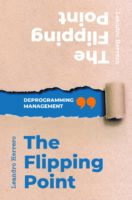A while ago, a telecom client complained to me about his particular division which seemed to work entirely ‘on relationships’. People got things done because of their own strong networks and highly cultivated personal connections. That was the ethos and the style of the place. His complaint was: ‘We need to have more structure and rely less on people’s relationships. This is too fluid, too personal, we are a proper company, for goodness sake!’
At a similar time, another client said the opposite to me: ‘We are a well oiled machine where everybody knows what to do, when, and with whom. It works! But, hey, I wish sometimes people tapped into their own internal relationships more, made things a bit more human, we are people, not systems!’
In both cases things seemed to ‘work’. What is clear is that each of these organisations were (and are) very different, particularly in the kind of people that compose their workforce. Hire a ‘structured person’ for an environment where people cut across barriers, sometimes processes, to use their personal relationships, and you will see how long this person will last (or the state of his mental health after a while). In contrast, to navigate in a ‘relationship-driven’ culture, you need particular leadership skills, not just technical or professional ones. Rely only on the hiring of ‘skilled people who have done it before’, and they will not necessarily understand the expectation of ‘personally liaising’ with a perhaps large network!
I told the complainers of ‘too much reliance on personal relationships’, that many people and organizations would love to have this in place. But I do recognise that, although the ‘relationship-driven’ environment may be a very enjoyable and successful one, it can also be tiring for even the most astute of relationship builders, who, at some peak of stress, might wish that ‘a well oiled machine’ took care of things, on its own…
The title of this Daily Thought contains the word ‘versus’, which implies an opposition. Many of you may think that this should not be the case, that ‘we need both’. This is a legitimate position, if a bit of ‘default thinking’ (we all tend to want everything), but the reality is that both environments don’t marry well.
Most of the problems we have in organizations come from expecting something from somewhere (people, processes, structure, leadership) that can never be delivered. It pays to pay attention to the ‘culture in place’ (whether a culture shaped intentionally or organically evolved and that has grown ‘on its own’) to have a realistic picture of the type of business execution that can be expected. There is more than one culture that ‘works’. The question is ‘how’ it works. Then, the next question is which one you want. That is which kind of ‘how’. And leaders should care about the ‘how’ as much if not more than about the ‘what’.
_____________________________________________________________________________________________
New webinar series – register now!
Feed Forward webinar series – the organization now, under new management
Machines work on feed-back. Minds work on feed-forward. We don’t need thermostats; we need new compasses. There is no ‘back to normal’. Normal has not been waiting for us. Leandro Herrero
To change to ‘the new normal’ we must think and act differently in the management of our organizations. Join Leandro Herrero and his team of organizational architects for these 5, free webinars as they debunk uncontested assumptions and uncover the alternatives, whilst considering why this is even more relevant today in the current exceptional environment. Join us and bring your critical thinking brain, switched on. It’s a serious business. It may also be fun.
Each participant who attends any of the live webinars of the Feed Forward series will be eligible for one copy of The Flipping Point.
Webinar topics:
- The myths of change.
- Can we put the company in an MRI? Can we diagnose its health in terms of its internal connectivity, communication and collaboration?
- The myths of company culture.
- The myths of management.
- High touch and high tech in the digitalization era
______________________________________________________________________________________________
The Flipping Point – Deprogramming Management
A flipping point in the trend for adopting absurd management ideas needs to be reached. Management needs deprogramming. This book asks you to use more rigour and critical thinking in how you use assumptions and management practices that were created many years ago. Our real and present danger is not a future of robots and AI, but of current established BS. In this book, you are invited to the Mother of All Call Outs!
Read the latest review.
Available from major online bookstores.




Would you like to comment?